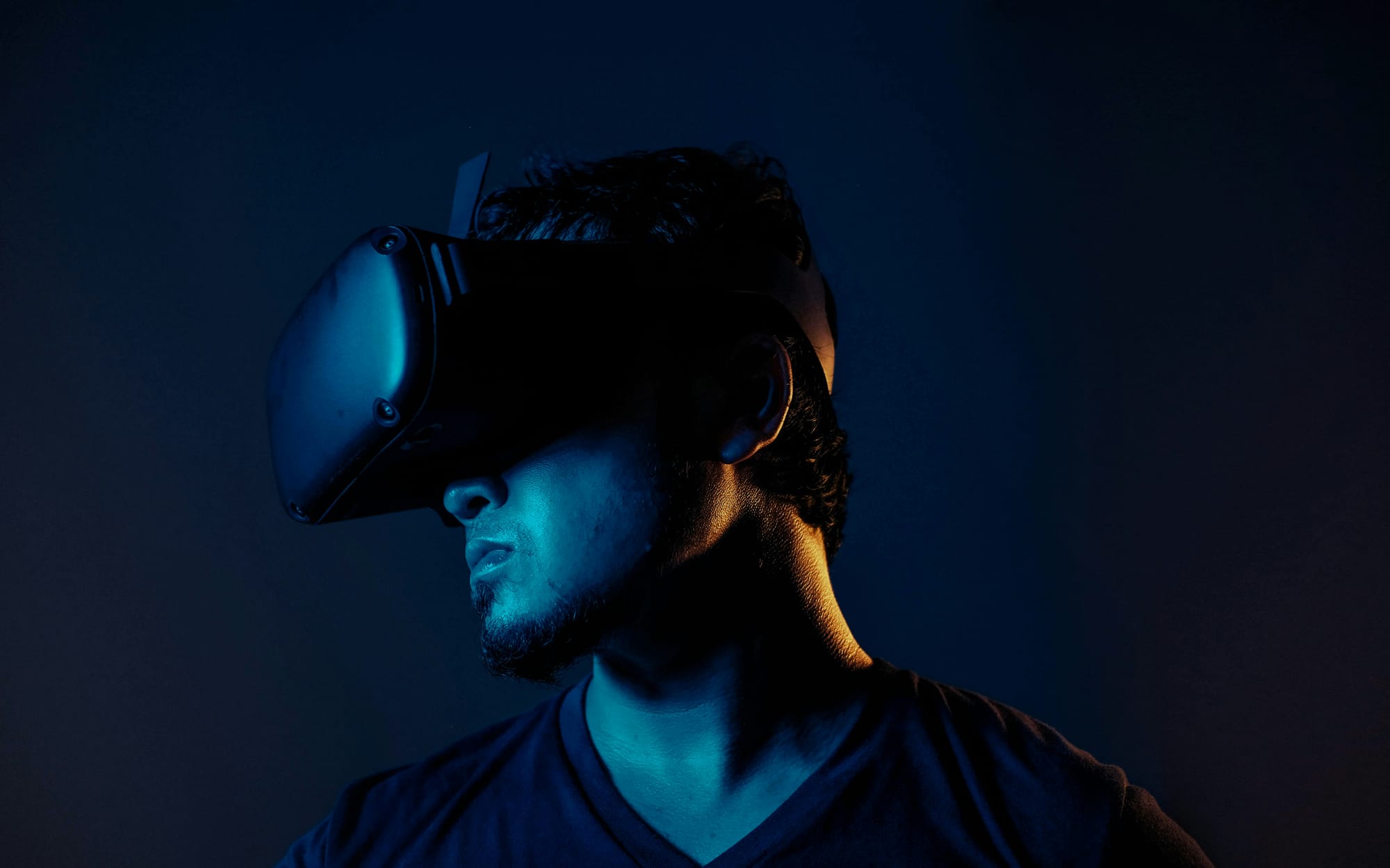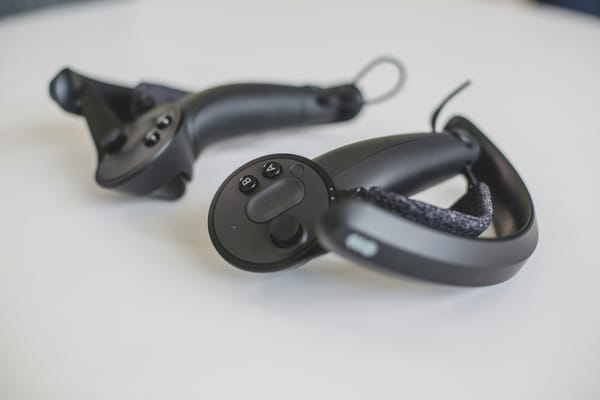Top 10 Benefits Of Virtual Reality In Business
Virtual reality is changing the way businesses operate. Learn about the 10 key benefits of virtual reality in business in your organization.

Explore the myriad benefits of virtual reality In Business and discover the transformative power it holds for the virtual workplace. From enhanced collaboration and training opportunities to immersive customer experiences, the utilization of virtual reality technology can revolutionize the way companies operate and engage with their stakeholders. Dive into this blog to uncover how virtual reality is reshaping the business landscape and driving innovation across various industries.
Table of Contents
- What Is VR Technology?
- 10 Benefits of Virtual Reality in Business
- 8 Industries That Benefit from Virtual Reality
- Get The Apple Vision Pro Experience for A Fraction of The Cost With Fluid
What Is VR Technology?

The hardware components of VR technology consist of VR headsets with built-in screens, lenses, and sensors for head tracking. These headsets transport users into immersive virtual worlds by displaying 3D visuals and tracking their head movements to adjust the display accordingly.
Handheld controllers or motion-tracking devices enable users to interact with the virtual environment, enhancing the level of engagement and interactivity. Some advanced VR experiences even incorporate specialized input devices like gloves or bodysuits to provide users with realistic tactile feedback, further enhancing the sense of presence within the virtual space.
Virtual Reality Experiences with Advanced Software Technologies
On the software side, VR experiences are powered by specific programming languages and frameworks that enable the creation of realistic visuals, spatial audio, and interactive elements. These software tools are designed to respond to user movements and actions, allowing for a dynamic and personalized experience within the virtual environment.
By combining sophisticated hardware components with advanced software technologies, VR creates a sensory-rich experience that mimics the physical world, making it a powerful tool for businesses seeking to enhance customer engagement, training programs, and digital marketing efforts.
Accessibility and Affordability of VR Technology for Businesses
Since its inception in the 1960s, VR technology has undergone significant advancements, making it more accessible and affordable for businesses of all sizes. Innovations in hardware design, such as the development of standalone VR headsets that do not require external sensors or a powerful PC, have lowered the barriers to entry for businesses looking to adopt VR technology.
These standalone headsets offer a cost-effective solution for companies seeking to leverage VR for virtual meetings, product demonstrations, or employee training without significant upfront investments in hardware infrastructure.
Empowering Business Innovation with VR Content Creation
The proliferation of VR content creation tools and platforms has democratized the development process, allowing businesses to create custom VR experiences tailored to their specific needs. This accessibility to VR content creation tools empowers businesses to experiment with new ways of engaging customers, training employees, and showcasing products or services in a virtual environment.
As a result, VR technology has become a valuable asset for forward-thinking businesses looking to differentiate themselves in the market and drive innovation in their respective industries.
Impact of Virtual Reality on Business Applications
Influential brands such as Microsoft, Sony, and Intel are leveraging VR technology to enhance their digital marketing efforts, engage customers in virtual experiences, and streamline internal operations. By incorporating VR into their business strategies, these companies are able to create more immersive and memorable experiences for their target audience, leading to increased brand awareness, customer loyalty, and sales conversions.
The versatility and potential of VR technology extend beyond marketing applications, with businesses increasingly utilizing VR for innovative solutions such as impactful meetings, interactive sales presentations, and immersive training programs. By harnessing the power of VR, businesses can transcend the limitations of traditional two-dimensional screens and create dynamic, interactive experiences that captivate users and drive meaningful engagement.
Revolutionizing Remote Work with Fluid's XR Workspace
Fluid allows you to create a flexible workspace in XR on the Meta Quest. With Fluid, you can place big screens anywhere in augmented reality. Fluid enables flexible workspaces and entertainment, cloud gaming, and much more. The most game-changing feature of all: Fluid allows you to create a virtual workstation with VR/AR using the Meta Quest, with virtually any screen size.
You can create your own $5,000+ work setup in VR/AR, and take it wherever you’d like to. Fluid solves remote working and remote work collaboration, long-distance relationships, remote teams, small startups with distributed cofounders, gamers that want a portable VR/AR gaming set, students, and much more. Turn your VR headset into a spatial computer for free today with Fluid.
Break free from physical screens, watch content on a big screen from anywhere, get into a deep flow state by being immersed in your work, and create a flexible workspace anywhere with Fluid.
Related Reading
- Vr Workplace
- Augmented Reality In The Workplace
- Vr Work From Home
- Vr Training
- Vr Design
- Vr Programs
- Vr In Business
- Vr Marketing
- Vr Conferencing
- Vr Meetings
- Virtual Reality Business Applications
10 Benefits of Virtual Reality in Business

Enhancing the customer experience is paramount for driving sales and fostering loyalty. Virtual Reality (VR) technology offers a game-changing solution by implementing a "try before you buy" strategy that allows customers to virtually test products.
This innovative approach not only increases sales but also builds trust and engagement, especially as businesses transition into the metaverse. By providing a better shopping experience, VR encourages more purchases both online and in physical stores, revolutionizing the way businesses interact with their customers.
1. Creating a Safe Work Environment Through VR Training
Safety is a top priority in any workplace, and VR training plays a crucial role in ensuring a safe environment for employees. Studies have shown that VR training can lead to a significant reduction in workplace injuries, with the Minesafe International Conference reporting a remarkable 43% decrease.
By offering a controlled environment for safety training, VR equips employees with the necessary skills to prevent real-life accidents and incidents. This not only saves companies money and protects their brand image but also boosts employee satisfaction, creating a culture of safety and well-being.
2. Building Strong Marketing Campaigns with Immersive VR Experiences
In the fast-paced world of marketing, businesses are constantly seeking innovative ways to engage customers effectively. VR technology provides a unique opportunity to create immersive and interactive experiences that captivate audiences like never before.
By leveraging storytelling through 360-degree videos, businesses can offer deeper insights into their brand, forging stronger connections with customers. This heightened engagement ultimately leads to increased sales and brand loyalty, making VR an invaluable tool for crafting powerful marketing campaigns.
3. Revolutionizing Education and Training Programs Through VR
Employee training is essential for skill development and performance improvement within organizations. VR offers a revolutionary approach to training by providing a risk-free and efficient environment for employees to practice a wide range of skills.
From soft skills to complex tasks, VR simulations enable employees to enhance their capabilities in a controlled setting, reducing the likelihood of costly errors. This results in better-prepared employees, ultimately saving time and costs associated with traditional training methods and boosting overall productivity.
4. Facilitating Easier Collaboration with VR Technology
Collaboration is key to success in today's business landscape, especially with the rise of remote and distributed teams. VR technology facilitates communication and collaboration by enabling virtual meetings that bridge the physical distance between team members. By enhancing team building and brainstorming sessions, VR fosters a stronger sense of community and synergy among team members. This not only solves logistical issues but also saves time and costs associated with travel, making collaboration more seamless and efficient.
5. Increasing Employee Engagement and Motivation Through Interactive VR Training
Employee engagement and motivation are essential drivers of productivity and job satisfaction within organizations. VR training offers a new dimension of engagement through interactive and immersive learning experiences.
By providing personalized training that simulates real-world scenarios, VR enhances skill development and information retention among employees. This, in turn, increases motivation and learning outcomes, making training more effective and enjoyable for employees across all levels of the organization.
6. Streamlining Product Design and Prototyping Processes with VR Technology
Innovative product design and rapid prototyping are critical components of success in a competitive market. VR technology revolutionizes the design process by allowing businesses to create and test virtual prototypes efficiently.
By reducing costs and time associated with physical prototyping, VR enables businesses to iterate and refine designs at a faster pace. The fluid and immersive workspace offered by VR is particularly beneficial for professionals in various industries, providing a versatile platform for innovation and creativity.
7. Harnessing Enhanced Data Visualization and Analytics with VR
Data visualization plays a crucial role in understanding complex patterns and relationships within business operations. VR technology offers advanced 3D visualizations that provide deeper insights than traditional methods, enabling better decision-making.
By tailoring visualizations to specific data needs, businesses can unlock actionable insights that drive strategic initiatives and optimize performance. VR's immersive approach to data analysis enhances the way businesses interpret information, leading to more informed and effective business strategies.
8. Transforming Real Estate and Architecture Visualization Through VR
The real estate and architecture industries rely heavily on visualizations to showcase properties and designs to clients. VR technology revolutionizes this process by enabling virtual tours and immersive architectural visualizations.
By offering clients a realistic and interactive experience, businesses can enhance decision-making and customer satisfaction. VR reduces the need for physical site visits, saving time and resources for both businesses and clients, ultimately streamlining the real estate and architecture visualization process.
9. Improving Remote Maintenance and Support with VR Solutions
Remote support and maintenance are essential components of efficient operations, especially in complex technical environments. VR technology facilitates real-time, virtual guidance for intricate procedures, significantly enhancing IT support capabilities.
By reducing downtime and improving efficiency, VR solutions lead to substantial cost savings for businesses. The elimination of the need for physical presence also enhances the effectiveness of remote support teams, making maintenance and support more agile and responsive.
10. Scalability and Realistic Simulation in VR Applications for Business
The scalability of VR technology makes it an ideal solution for businesses with large workforces or multiple locations. VR can simultaneously train a large number of employees, making it a cost-effective and efficient tool for organizations of all sizes.
The realistic simulation capabilities of VR allow trainees to practice and develop skills in a safe and controlled environment. This eliminates the risk of injury or damage to equipment, ultimately enhancing the learning experience and skill development for employees.
Experience the Future of Work with Fluid
Ready to unlock the full potential of Virtual Reality in your business? Fluid allows you to create a flexible workspace in Extended Reality (XR) on the Meta Quest, transforming your VR headset into a spatial computer. With Fluid, you can seamlessly place large screens anywhere in augmented reality, enabling flexible workspaces, cloud gaming, and more. The groundbreaking feature of Fluid lies in its ability to create a virtual workstation with VR/AR on the Meta Quest, offering virtually any screen size for a truly immersive work setup.
Say goodbye to traditional screens and embrace the future of work with Fluid - turn your VR headset into a spatial computer today for a game-changing work experience.
8 Industries That Benefit from Virtual Reality

1. Healthcare and Well-Being: Revolutionizing Medical Treatments and Patient Care
In the healthcare industry, Virtual Reality (VR) and Augmented Reality (AR) technologies are reshaping medical treatments and patient care. Surgeons are utilizing augmented-reality systems to achieve enhanced precision in surgeries, leading to better outcomes. VR is also proving to be a valuable tool in treating phobias, anxieties, and pediatric patients, providing immersive and less intimidating experiences.
VR is being leveraged in physical therapy and rehabilitation for improved patient engagement and results. VR plays a crucial role in the education of medical students by virtually simulating operating rooms and human anatomy, fostering safer practices and increased productivity.
2. Entertainment and Gaming: Immersive Experiences Beyond Gaming
The entertainment and gaming industry stands as a pioneer in the application of VR technology, offering users unique and immersive experiences within 3D environments. VR has not only enhanced gameplay but has also evolved the social aspects of gaming, allowing players to engage in virtual spaces beyond traditional gaming boundaries. VR extends to virtual galleries, cinemas, and museums, providing new experiences for the visually impaired and enhancing cultural engagement through tactile feedback technologies.
3. Tourism: Transforming Travel Experiences Through Virtual Reality
Virtual Reality is revolutionizing the tourism industry by offering virtual tours that enable customers to explore destinations, landscapes, hotel rooms, and attractions before physically visiting them.
This immersive experience enhances travel planning, increases customer satisfaction, and allows individuals to make informed decisions about their travel destinations. Technologies like Google Street View have paved the way for virtual travel experiences, changing the way people explore the world.
4. Retail: Redefining the Shopping Experience with VR and AR
Both online and in-store shopping experiences are being reshaped by VR and AR technologies, making them more interactive and engaging for consumers. Virtual fitting rooms, in-store AR navigation, and AR-overlaid product information are enhancing the shopping experience, leading to better consumer engagement and informed purchasing decisions.
5. Education and Training Programs: Engaging Learning Through Realistic Simulations
VR technology offers realistic simulations for educational purposes, transforming traditional learning materials into interactive and effective experiences. From historical events to geographical explorations, VR enhances learning by providing engaging and memorable experiences for students. VR creates safe environments for training in high-risk scenarios, significantly improving learning outcomes across various educational and training programs.
6. Production-Driven Businesses and Automotive Industry: Enhancing Productivity Through VR Applications
VR applications play a vital role in production-driven businesses and the automotive industry by reducing design and production times, optimizing manufacturing processes, and providing effective training tools. These technologies facilitate industrial automation, remote assistance, and collaborative workspaces, ultimately enhancing productivity and safety measures within these sectors.
7. Architecture and Real Estate: Immersive Visualization for Enhanced Client Experiences
In the architecture and real estate industries, VR technology significantly improves architectural visualization by offering immersive experiences that effectively convey designs to clients. Real estate benefits from virtual tours that allow potential buyers to explore properties remotely, aiding in purchasing decisions and streamlining the sales process.
8. Sports: Revolutionizing Training and Fan Experiences Through VR
The sports industry has been impacted by VR technology, offering virtual training tools for athletes, immersive fan experiences, and engaging content. From virtual attendance at live events to intensive training simulators, VR is transforming the way athletes train and perform, while also providing fans with new ways to interact with their favorite sports and athletes.
Unlocking Productivity and Flexibility with Fluid's XR Workspace
Fluid allows you to create a flexible workspace in XR on the Meta Quest. With Fluid, you can place big screens anywhere in augmented reality. The most game-changing feature of all: Fluid allows you to turn your VR headset into a spatial computer for free today, creating a virtual workstation with VR/AR using the Meta Quest and virtually any screen size. Break free from physical screens, watch content on a big screen from anywhere, get into a deep flow state by being immersed in your work, and create a flexible workspace anywhere with Fluid.
Related Reading
- Virtual Reality In Healthcare
- Virtual Reality In The Classroom
- Virtual Reality In Architecture
- Virtual Reality Therapy
- Teams Vr
- Working In Vr
- Vr Collaboration
- Vr Educational Apps
- Vr Data Visualization
- Virtual Reality Presentation
- Vr Prototyping
- Enterprise Virtual Reality
- Immersed Vs Virtual Desktop
- Vr Productivity Apps
- Virtual Reality For Training Employees
Get The Apple Vision Pro Experience for A Fraction of The Cost With Fluid
Fluid, a groundbreaking feature on the Meta Quest, revolutionizes the concept of workspace flexibility in virtual reality (VR). By harnessing the power of Fluid, users can seamlessly create dynamic workspaces in XR, enhancing work productivity and collaboration. With Fluid, the possibilities are endless - from placing large screens in augmented reality to customizing virtual workstations with any screen size.
Enhancing Remote Work Collaboration and Productivity
One of the most game-changing features of Fluid is its ability to transcend physical limitations and create virtual work environments tailored to individual needs. This innovation not only addresses the challenges of remote working but also fosters seamless collaboration among dispersed teams. By leveraging Fluid, businesses can overcome geographical barriers, enabling remote teams, distributed co-founders, and long-distance relationships to work together efficiently.
Empowering Cloud Gaming and Entertainment Experiences
Beyond work-related applications, Fluid opens up new horizons for cloud gaming and entertainment in VR. Users can immerse themselves in a world of virtual entertainment, enjoying content on large screens from any location. This versatility not only enhances the gaming experience but also offers a gateway to diverse entertainment options, making VR a multifaceted platform for leisure and relaxation.
Facilitating Portable VR/AR Workstations for Various Users
Fluid's ability to transform VR headsets into spatial computers paves the way for diverse applications across different user groups. Whether you're a professional seeking a portable workstation, a student looking for innovative study tools, or a gamer aiming for an unparalleled gaming experience, Fluid caters to a wide range of needs. By creating flexible workspaces and immersive environments, Fluid empowers users to break free from traditional constraints and unleash their creativity.
Driving Productivity and Flow State in Virtual Environments
By enabling users to immerse themselves in their work through Fluid, a deep state of flow can be achieved, leading to enhanced productivity and focus. The seamless integration of large screens and customizable workspaces in VR fosters a conducive environment for concentration and creativity. As a result, users can elevate their work experience, tapping into the full potential of virtual reality technology.
Seize the Future of Work with Fluid on Meta Quest
Fluid on the Meta Quest heralds a new era of flexible workspaces, remote collaboration, and immersive experiences in virtual reality. By embracing this innovative feature, businesses, professionals, and individuals can unlock a myriad of benefits, from enhanced productivity to unparalleled entertainment.
With Fluid, the possibilities are limitless - transform your VR headset into a spatial computer today and redefine the way you work and play.



